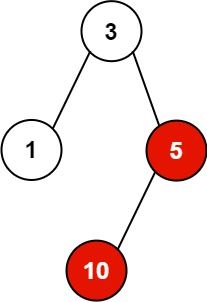You have n processes forming a rooted tree structure. You are given two integer arrays pid and ppid, where pid[i] is the ID of the ith process and ppid[i] is the ID of the ith process's parent process.
Each process has only one parent process but may have multiple children processes. Only one process has ppid[i] = 0, which means this process has no parent process (the root of the tree).
When a process is killed, all of its children processes will also be killed.
Given an integer kill representing the ID of a process you want to kill, return a list of the IDs of the processes that will be killed. You may return the answer in any order.
Example 1:
Input: pid = [1,3,10,5], ppid = [3,0,5,3], kill = 5 Output: [5,10] Explanation: The processes colored in red are the processes that should be killed.
Example 2:
Input: pid = [1], ppid = [0], kill = 1 Output: [1]
Constraints:
n == pid.lengthn == ppid.length1 <= n <= 5 * 1041 <= pid[i] <= 5 * 1040 <= ppid[i] <= 5 * 104- Only one process has no parent.
- All the values of
pidare unique. killis guaranteed to be inpid.
class Solution:
def killProcess(self, pid: List[int], ppid: List[int], kill: int) -> List[int]:
def dfs(u):
ans.append(u)
for v in g[u]:
dfs(v)
g = defaultdict(list)
n = len(pid)
for c, p in zip(pid, ppid):
g[p].append(c)
ans = []
dfs(kill)
return ansclass Solution {
private Map<Integer, List<Integer>> g;
private List<Integer> ans;
public List<Integer> killProcess(List<Integer> pid, List<Integer> ppid, int kill) {
g = new HashMap<>();
for (int i = 0, n = pid.size(); i < n; ++i) {
int c = pid.get(i), p = ppid.get(i);
g.computeIfAbsent(p, k -> new ArrayList<>()).add(c);
}
ans = new ArrayList<>();
dfs(kill);
return ans;
}
private void dfs(int u) {
ans.add(u);
for (int v : g.getOrDefault(u, new ArrayList<>())) {
dfs(v);
}
}
}class Solution {
public:
vector<int> killProcess(vector<int>& pid, vector<int>& ppid, int kill) {
unordered_map<int, vector<int>> g;
vector<int> ans;
int n = pid.size();
for (int i = 0; i < n; ++i) {
int c = pid[i], p = ppid[i];
g[p].push_back(c);
}
dfs(kill, g, ans);
return ans;
}
void dfs(int u, unordered_map<int, vector<int>>& g, vector<int>& ans) {
ans.push_back(u);
for (int v : g[u]) dfs(v, g, ans);
}
};func killProcess(pid []int, ppid []int, kill int) []int {
g := make(map[int][]int)
for i, c := range pid {
p := ppid[i]
g[p] = append(g[p], c)
}
var ans []int
var dfs func(u int)
dfs = func(u int) {
ans = append(ans, u)
for _, v := range g[u] {
dfs(v)
}
}
dfs(kill)
return ans
}
